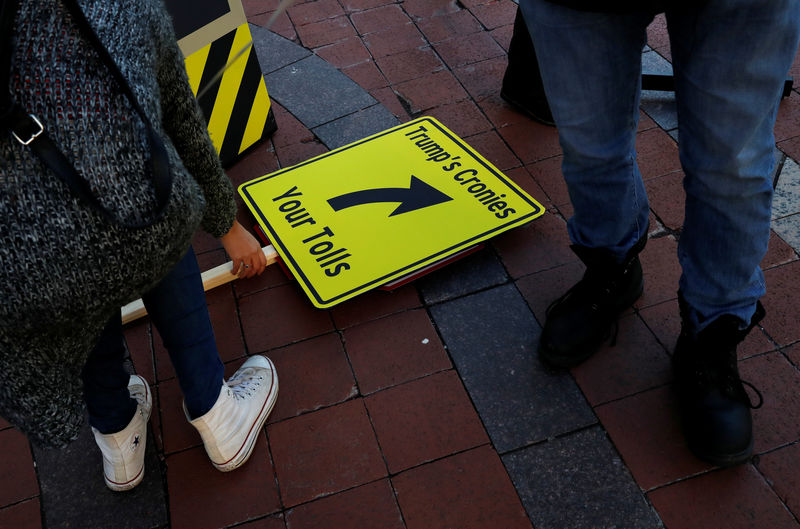By David Shepardson
WASHINGTON (Reuters) - President Donald Trump unveiled a long-awaited infrastructure plan on Monday designed to encourage spending on improvements by states, localities and private investors, but it faces an uphill battle in Congress and he made remarks that called into question how hard he will fight for it.
Trump asked Congress, controlled by his fellow Republicans, to authorize $200 billion over 10 years to spur a projected $1.5 trillion in road, bridge and other projects to rebuild what he called "America's crumbling infrastructure."
The proposal came under immediate fire from Democrats who said it would put a huge burden on local governments without providing enough federal dollars, and administration officials acknowledged that it faces a tough road ahead.
Trump, who as a candidate promised a major infrastructure plan, said he looked forward to working with lawmakers, but added, "If for any reason they don't want to support it, hey, that's going to be up to them."
"What was very important to me was the military. What was very important to me was the tax cuts. And what was very important to me was regulation. This is of great importance, but it's not nearly in that category," Trump told a meeting of state and local officials at the White House.
The plan, which Trump called the "biggest and boldest infrastructure investment in American history," would reshape how the federal government funds infrastructure projects. It also seeks to sweep away environmental and other regulatory hurdles to new projects.
If the proposal comes to fruition, many Americans could face higher local taxes, fees and tolls imposed by states to pay for new repairs in order to get federal matching funds.
The proposal is intended to spur state and local governments and the private sector to increase spending on infrastructure without a major infusion of federal dollars. It offers relatively little in the way of new federal money considering the magnitude of infrastructure needs, and its $1.5 trillion projection relies on states and cities accepting far less in matching funds for infrastructure projects than they would receive for traditional federal funds.
The plan also calls for eliminating hurdles to selling federal property and lists as examples of potential properties to sell Reagan National Airport and Dulles International Airport in Washington's Virginia suburbs as well as two key roadways in the Washington region operated by the National Park Service.
Under the proposal, the Interior Department could tap some funds from energy and mineral extraction to pay for infrastructure improvements on government-owned land such as national parks.
Trump has made his infrastructure plan one of his top legislative priorities this year, ahead of the November mid-term congressional elections in which Democrats will try to take over control of Congress from his party.
Democrats said the administration's budget blueprint would actually cut at least $168 billion in planned infrastructure spending to pay for the proposal.
Representative Peter DeFazio, the top Democrat on the House of Representatives Transportation and Infrastructure Committee, called Trump's proposal "embarrassingly small," adding, "President Trump's plan slashes real federal investments and shifts the burden to cash-strapped states and local governments."
DeFazio said it would "pay for Wall Street and foreign investors to toll our roads, and it would gut bedrock environmental, clean water, and clean air protections under the guise of speeding up projects."
'MAGICAL THINKING'
Democratic Senator Richard Blumenthal said Trump's plan "relies on magical thinking, massive private profits, and a pittance of public investment."
U.S. Transportation Secretary Elaine Chao told reporters that the government should lift hurdles to private sector infrastructure funding and encourage state and local participation. The federal government cannot do it alone, she said.
"Unfortunately there's not enough money to be able to pay for all the infrastructure needs of our country," Chao said.
The plan does not offer nearly as much new federal funding as Democrats wanted nor does it directly address how the federal government will find the money it does call for, instead pointing to a variety of proposed cuts in its budget released on Monday. The administration called the proposal a starting point for negotiations.
The Republican chairman of the House Energy and Commerce Committee, Greg Walden, said in a joint statement with fellow Republicans that "Trump hit the nail on the head when constructing this plan to rebuild America's infrastructure."
Congress has not raised the gas since 1993 and has added $137 billion since 2008 to make up highway repair shortfalls. Congress must find another $107 billion through 2026 alone to keep spending at current levels.

Trump met at the White House with state and local officials including the governors of Wisconsin, Louisiana, Virginia and Maine on Monday, and was due to meet with congressional leaders on Wednesday on the proposal.